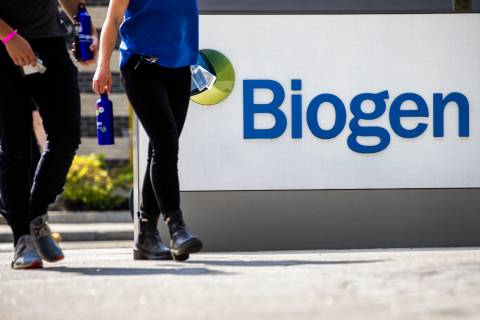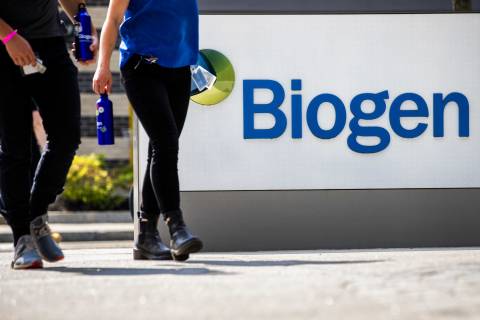(Bloomberg) -- Eisai Co shares fell the most in about 16 months following a report of a second death potentially linked to the groundbreaking experimental drug for Alzheimer’s disease it’s developing with Biogen Inc.

The case involved a 65-year-old woman who died of a massive brain hemorrhage after suffering a stroke and a type of brain swelling and bleeding in an Eisai trial, according to a report in Science magazine. The bleeding began after the patient received an anti-clotting drug, the report said. Brain swelling and bleeding have previously been linked to medicines that work like the Biogen-Eisai treatment.

Eisai shares plunged as much as 12% in Tokyo Tuesday, the largest intraday drop since July 16 last year. Biogen fell 4.3% Monday in New York, the most since Sept. 29.
The drug, lecanemab, is the first to slow progression of Alzheimer’s in a large clinical trial, a medical milestone that has fueled hopes of altering the course of the disease for millions of patients. Biogen and Eisai have published only minimal data from the trial, however, with more results due to be presented at a conference this week.
The potentially linked deaths adds to uncertainty over whether regulators and doctors will be able to fully understand the risks and benefits of the medication, and if the net result is good for patients. While patients are willing to take significant bets if they have a serious condition, like cancer, the long-term benefits of lecanemab aren’t yet known.
With no other options, however, some analysts are betting the drug will survive this latest challenge. The potential for bleeding should be disclosed in the drug’s label, allowing doctors and patients to make an informed decision, said Jefferies analyst Michael Yee in a Monday note.
“We believe the drug will get approved, get reimbursed, and lead to good uptake over time,” he wrote.
Analysts Divided
Experts were divided on the question of whether the deaths were caused by the drug, while an Eisai spokeswoman said in a statement that all available information indicates that lecanemab isn’t associated with an increased risk of death overall.
It can be difficult to determine the cause of death in ill and elderly patients who’ve received other medicines, the company said. Biogen referred questions about the death to Eisai.
Rudolph Castellani, a neuropathologist at Northwestern University who investigated the death, blamed it on the “one-two punch” of lecanemab and the anti-clotting drug, called tPA, Science reported.
“There’s zero doubt in my mind that this is a treatment-caused illness and death,” he told Science, saying that these were personal views and not reviewed or approved by Northwestern. “If the patient hadn’t been on lecanemab she would be alive today.”
When reached by Bloomberg News, Castellani confirmed he had examined the deceased patient’s brain and had “no amendments” to his comments quoted in Science.
While the report report “reignited safety concerns with this class,” Baird Equity Research analyst Brian Skorney said in a note to clients, “we think the interpretation that lecanemab is the causative factor is aggressive. This patient clearly went into crisis following tPA administration. The elevation of bleeding risk due to lecanemab could be playing a role, but we think direct attribution is a stretch.”
Hidemaru Yamaguchi, an analyst at Citigroup Global Markets Japan Inc. said a few cases of side effects can’t determine the overall outcome of the drug trials, while the report will likely be in the spotlight at the conference.
“This report comes on the heels of another previous deaths,” he said in a note to clients. “Currently the details are unclear, with the questions of whether the deaths was caused by the drugs and how the clinical trials should be evaluated remaining pending. It would not be scientifically correct to debate the worth of the trials as a whole based on a few incidents.”
BioArctic AB, the Swedish biotech where the drug originated, fell 13% in Stockholm. The company has the right to commercialize the Alzheimer’s drug in the Nordics under certain conditions, and it’s preparing to do that together with Eisai. They also are entitled to milestone payments as well as royalties on global sales.
Eisai doesn’t have insight into this specific study, spokesman Oskar Bosson said.
--With assistance from Jonas Ekblom, Bre Bradham and Kanoko Matsuyama.
(Updates with details from fifth paragraph.)
More stories like this are available on bloomberg.com
©2022 Bloomberg L.P.
Author: Naomi Kresge
